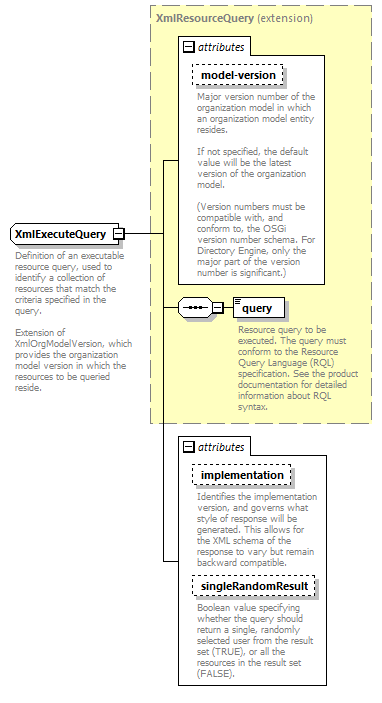| diagram |  |
||||||||||||||||||||||||||||||
| namespace | http://api.organisation.common.n2.tibco.com | ||||||||||||||||||||||||||||||
| type | extension of XmlResourceQuery | ||||||||||||||||||||||||||||||
| properties |
|
||||||||||||||||||||||||||||||
| children | query | ||||||||||||||||||||||||||||||
| attributes |
|
||||||||||||||||||||||||||||||
| annotation |
|
||||||||||||||||||||||||||||||
| source | <xsd:complexType name="XmlExecuteQuery"> <xsd:annotation> <xsd:documentation>Definition of an executable resource query, used to identify a collection of resources that match the criteria specified in the query. Extension of XmlOrgModelVersion, which provides the organization model version in which the resources to be queried reside.</xsd:documentation> </xsd:annotation> <xsd:complexContent> <xsd:extension base="XmlResourceQuery"> <xsd:attribute name="implementation" type="xs:int" default="1"> <xsd:annotation> <xsd:documentation>Identifies the implementation version, and governs what style of response will be generated. This allows for the XML schema of the response to vary but remain backward compatible.</xsd:documentation> </xsd:annotation> </xsd:attribute> <xsd:attribute name="singleRandomResult" type="xs:boolean" use="optional"> <xsd:annotation> <xsd:documentation>Boolean value specifying whether the query should return a single, randomly selected user from the result set (TRUE), or all the resources in the result set (FALSE).</xsd:documentation> </xsd:annotation> </xsd:attribute> </xsd:extension> </xsd:complexContent> </xsd:complexType> |
attribute XmlExecuteQuery/@implementation
| type | xs:int | ||
| properties |
|
||
| annotation |
|
||
| source | <xsd:attribute name="implementation" type="xs:int" default="1"> <xsd:annotation> <xsd:documentation>Identifies the implementation version, and governs what style of response will be generated. This allows for the XML schema of the response to vary but remain backward compatible.</xsd:documentation> </xsd:annotation> </xsd:attribute> |
attribute XmlExecuteQuery/@singleRandomResult
| type | xs:boolean | ||
| properties |
|
||
| annotation |
|
||
| source | <xsd:attribute name="singleRandomResult" type="xs:boolean" use="optional"> <xsd:annotation> <xsd:documentation>Boolean value specifying whether the query should return a single, randomly selected user from the result set (TRUE), or all the resources in the result set (FALSE).</xsd:documentation> </xsd:annotation> </xsd:attribute> |
WSDL documentation generated by XMLSpy WSDL Editor http://www.altova.com/xmlspy